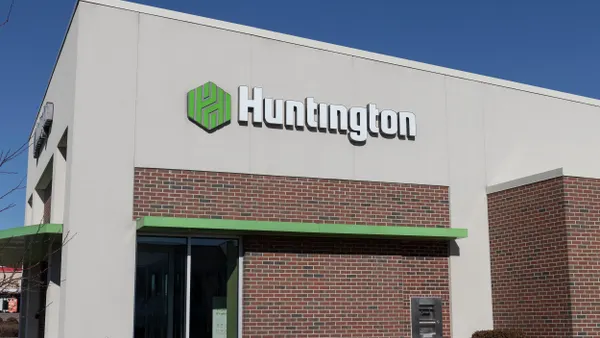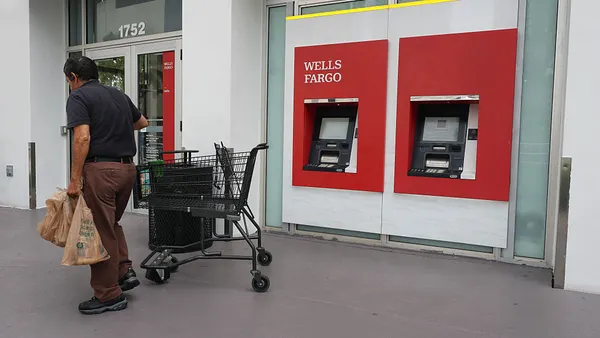Dive Brief:
- Birmingham, Alabama-based Regions Bank agreed Tuesday to pay $960 million to buy EnerBankUSA, a Salt Lake City-based home improvement lender in a deal slated to close in the fourth quarter.
- Regions has taken a piecemeal approach to acquisitions over the past several years, targeting nonbank niche financial services companies to bolster segments of its business. It bought health care industry-focused asset management company Highland Associates in 2019, and followed that up in 2020 by purchasing equipment finance lender Ascentium Capital.
- "We have thoughtfully evaluated the home improvement point-of-sale lending space for a number of years, and we believe this is the right partner at the right time to deliver on our vision," Scott Peters, head of Regions’s consumer banking group, said in a press release Tuesday.
Dive Insight:
Regions CEO John Turner has long expressed a preference for smaller deals.
"M&A is very disruptive. The economics of bank M&A haven’t looked particularly compelling to us, and we believe we have a strategic plan that, if we execute it, we’ll deliver superior financial results for our shareholders," Turner told the Birmingham Business Journal last year. "Having said that … we’re always looking at opportunities to develop more capabilities, to grow and diversify revenue, and we’ll do that through nonbank M&A."
The EnerBank deal wouldn’t be Regions’s first foray into home improvement lending. The Alabama bank had forged a partnership with point-of-sale home improvement lender GreenSky, but opted not to renew that contract in 2019. Regions asserted it wanted to focus more on direct relationships with its customers. But GreenSky Chief Administrative Officer Gerry Benjamin said he suspected otherwise.
"The only thing that we can conclude is Regions believes that they can redeploy these assets and generate a higher return on a risk-adjusted basis," Benjamin told American Banker.
The EnerBank tie-up would let Regions add digital and phone-based point-of-sale lending capabilities to its existing investments in mortgage and home equity lending.
"EnerBank’s platform and skilled financial professionals, combined with the reach and experience of Regions’ consumer banking teams, will help us deepen relationships with clients while reaching new customers," Peters said.
Through the deal, EnerBank would leave the fold of Jackson, Michigan-based energy company CMS Energy. EnerBank’s 450 employees, including CEO Charlie Knadler, would join Regions. The company would maintain its Salt Lake City headquarters.
"While CMS Energy continues to focus on leading a world-class energy company, we believe that EnerBank can achieve its full potential as part of Regions Bank," Rejji Hayes, the chairman of EnerBank’s board and CFO of CMS Energy, said in a press release.
EnerBank, whose clients are mainly prime and super-prime consumers, held roughly $2.8 billion in loans as of March 31. It lends in all 50 states and has worked with more than 1 million homeowners and 10,000 contractors in its 20-year history, the company said.
"By joining the team at Regions, we have a tremendous opportunity to connect more clients with custom-tailored home improvement lending options," Knadler said. "This combination with Regions brings together the strengths of two great companies that are putting customers first."
A number of banks this year have leaned toward acquiring strategic pieces of business to diversify their companies rather than absorbing a similarly sized bank. U.S. Bank, for example, agreed in January to purchase MUFG Union Bank’s $320 billion custody portfolio. Silicon Valley Bank, in the same week, agreed to buy Boston Private in a $900 million deal to bolster its wealth-management presence.
Wells Fargo, on the other hand, has played the seller. It has considered spinning off several units as it redefines what is core to its business. The bank jettisoned its asset-management unit in February for $2.1 billion. It agreed in December to sell its student-loan portfolio. And, last fall, the San Francisco lender weighed selling its corporate-trust unit.
EnerBank is an industrial loan company (ILC)— a setup that has served as a lightning rod among lawmakers who have blasted nonbanks for using that structure to offer banking services without being subject to Federal Reserve oversight.
Home Depot considered buying EnerBank in 2006 — and in doing so, would have been given access to its ILC charter. But the home-improvement retailer scrapped that plan in 2008, in a journey similar to fellow retailer Walmart’s flirtation with an ILC charter that began in 2005 and likewise ended two years later.














